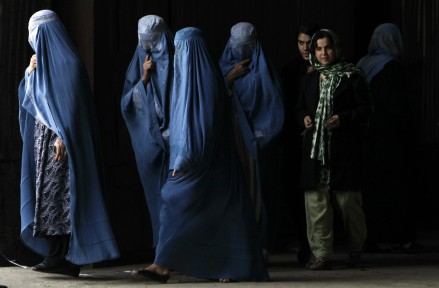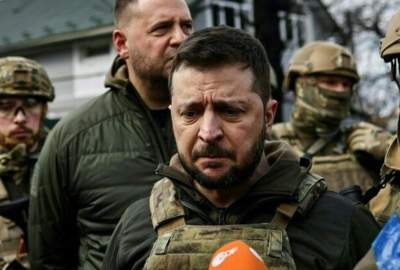In 2009, the United States gave Wazhma Frogh the International Woman of Courage award for her women's rights activism in Afghanistan.
Four years later, the United States denied her a visa when she was trying to get away from an Afghan militia commander who she says was persecuting her.
For Frogh, the experience underlined the state of the women's right movement in her country. Thirteen years after the fall of the Taliban, billions of dollars have been spent, there have been countless words of support from the West and from the Afghan government, yet the successes that have been achieved remain vulnerable. Ultimately, women still have nowhere to turn when their battle for equal rights puts them on the firing line, she said.
"They give you an award but they don't support you when you need them," she told The Associated Press. "I always thought that if my government didn't help me I would always be able to turn to the United States. I never thought that they would turn their back on me."
Gains have been made. Gone are the rules imposed by the Taliban forcing women to wear the all-encompassing burqa and barring girls from school. Now, as many as 4 million girls are in school, and women sit in Afghanistan's parliament.
But Frogh and other women's activists said those changes, while important, are superficial. Women's equality was a priority when the memory of the Taliban was fresh, but over the years the commitment has waned. It became a mantra recited by the Afghan government and non-government organizations to get international funding, and a flag for Western governments to wave as a symbol of success over the Taliban, said Frogh and Afghan parliamentarian, Fawzia Koofi.
"Women's rights is the most politicized issue in Afghanistan, before even talks with the Taliban, and I am not happy with it," said Koofi, referring to the Afghan government's attempts to negotiate with Taliban insurgents, raising women activists' fears authorities will compromise on their rights if necessary to reach a deal.
Koofi said she is proud and grateful for the successes. But "after 13 years I am still being forced to ask for my basic rights."
Many of the victories have major caveats. Girls are back in school, but most are pulled out by their families as they near puberty to ready them for marriage, she said.
A hard-fought Law on the Elimination of Violence against Women was passed. More women are reporting cases of abuse and are aware of their right to speak out, said Georgette Gagnon, director of Human Rights with the United Nations Assistance Mission in Afghanistan.
But, she said, few cases make it to court and prosecution is rare. Instead most end up in mediation, often through jirgas - a traditional council of elders - or other community councils, which rarely work in favor of the woman.
"Often this mediation doesn't fully protect woman's rights and often leads to more violence against the woman," said Gagnon.
The few Afghan businesswomen are paraded as success stories, while women are still having their lips cut off for perceived offenses, as happened recently in northern Afghanistan, said Frogh.
More than 80 percent of the women in prisons are jailed for so-called "moral crimes," like leaving an abusive husband. Shelters for abused women have been set up, but most men in conservative Afghanistan, even those in the Ministry of Interior, see shelters as "immoral," and women who seek sanctuary there are often banished from their communities, Frogh said.
Afghan President Hamid Karzai's first Cabinet featured five female members, the next only two. The quota for women in district councils was 25 percent, but has been reduced to 20 percent. The government set up a Women's Affairs Ministry but doesn't give it the money to hire the staff it needs. (AP)
Four years later, the United States denied her a visa when she was trying to get away from an Afghan militia commander who she says was persecuting her.
For Frogh, the experience underlined the state of the women's right movement in her country. Thirteen years after the fall of the Taliban, billions of dollars have been spent, there have been countless words of support from the West and from the Afghan government, yet the successes that have been achieved remain vulnerable. Ultimately, women still have nowhere to turn when their battle for equal rights puts them on the firing line, she said.
"They give you an award but they don't support you when you need them," she told The Associated Press. "I always thought that if my government didn't help me I would always be able to turn to the United States. I never thought that they would turn their back on me."
Gains have been made. Gone are the rules imposed by the Taliban forcing women to wear the all-encompassing burqa and barring girls from school. Now, as many as 4 million girls are in school, and women sit in Afghanistan's parliament.
But Frogh and other women's activists said those changes, while important, are superficial. Women's equality was a priority when the memory of the Taliban was fresh, but over the years the commitment has waned. It became a mantra recited by the Afghan government and non-government organizations to get international funding, and a flag for Western governments to wave as a symbol of success over the Taliban, said Frogh and Afghan parliamentarian, Fawzia Koofi.
"Women's rights is the most politicized issue in Afghanistan, before even talks with the Taliban, and I am not happy with it," said Koofi, referring to the Afghan government's attempts to negotiate with Taliban insurgents, raising women activists' fears authorities will compromise on their rights if necessary to reach a deal.
Koofi said she is proud and grateful for the successes. But "after 13 years I am still being forced to ask for my basic rights."
Many of the victories have major caveats. Girls are back in school, but most are pulled out by their families as they near puberty to ready them for marriage, she said.
A hard-fought Law on the Elimination of Violence against Women was passed. More women are reporting cases of abuse and are aware of their right to speak out, said Georgette Gagnon, director of Human Rights with the United Nations Assistance Mission in Afghanistan.
But, she said, few cases make it to court and prosecution is rare. Instead most end up in mediation, often through jirgas - a traditional council of elders - or other community councils, which rarely work in favor of the woman.
"Often this mediation doesn't fully protect woman's rights and often leads to more violence against the woman," said Gagnon.
The few Afghan businesswomen are paraded as success stories, while women are still having their lips cut off for perceived offenses, as happened recently in northern Afghanistan, said Frogh.
More than 80 percent of the women in prisons are jailed for so-called "moral crimes," like leaving an abusive husband. Shelters for abused women have been set up, but most men in conservative Afghanistan, even those in the Ministry of Interior, see shelters as "immoral," and women who seek sanctuary there are often banished from their communities, Frogh said.
Afghan President Hamid Karzai's first Cabinet featured five female members, the next only two. The quota for women in district councils was 25 percent, but has been reduced to 20 percent. The government set up a Women's Affairs Ministry but doesn't give it the money to hire the staff it needs. (AP)
Source : Afghan Voice Agency (AVA), International Service







